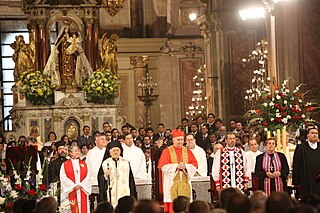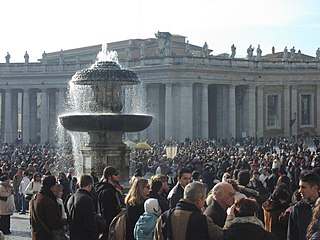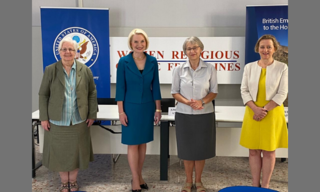Related Research Articles

An ecumenical council, also called general council, is a meeting of bishops and other church authorities to consider and rule on questions of Christian doctrine, administration, discipline, and other matters in which those entitled to vote are convoked from the whole world (oikoumene) and which secures the approbation of the whole Church.
Full communion is a communion or relationship of full agreement among different Christian denominations that share certain essential principles of Christian theology. Views vary among denominations on exactly what constitutes full communion, but typically when two or more denominations are in full communion it enables services and celebrations, such as the Eucharist, to be shared among congregants or clergy of any of them with the full approval of each.

Ecumenism, also spelled oecumenism, is the concept and principle that Christians who belong to different Christian denominations should work together to develop closer relationships among their churches and promote Christian unity. The adjective ecumenical is thus applied to any initiative that encourages greater cooperation and union among Christian denominations and churches.

The Eastern Catholic Churches or Oriental Catholic Churches, also called the Eastern-Rite Catholic Churches, Eastern Rite Catholicism, or simply the Eastern Churches, are 23 Eastern Christian autonomous particular churches of the Catholic Church, in full communion with the Pope in Rome. Although they are distinct theologically, liturgically, and historically from the Latin Church, they are all in full communion with it and with each other. Eastern Catholics are a distinct minority within the Catholic Church; of the 1.3 billion Catholics in communion with the Pope, approximately 18 million are members of the eastern churches.

The East–West Schism is the ongoing break of communion between the Roman Catholic and Eastern Orthodox churches since 1054. It is estimated that, immediately after the schism occurred, a slim majority of Christians worldwide were Eastern Christians comprised; most of the rest were Western Christians. The schism was the culmination of theological and political differences between Eastern and Western Christianity that had developed during the preceding centuries.

The Catholic Church, also known as the Roman Catholic Church, is the largest Christian church, with 1.3 billion baptized Catholics worldwide as of 2019. It is among the world's oldest and largest international institutions, and has played a prominent role in the history and development of Western civilization. The church consists of 24 sui iuris churches, including the Latin Church and 23 Eastern Catholic Churches, which comprise almost 3,500 dioceses and eparchies located around the world. The pope, who is the bishop of Rome, is the chief pastor of the church. The bishopric of Rome, known as the Holy See, is the central governing authority of the church. The administrative body of the Holy See, the Roman Curia, has its principal offices in Vatican City, a small enclave of the Italian city of Rome, of which the pope is head of state.

Papal primacy, also known as the primacy of the bishop of Rome, is a Roman Catholic ecclesiological doctrine concerning the respect and authority that is due to the pope from other bishops and their episcopal sees. The doctrine is accepted at a fundamental level by both the Catholic Church and Eastern Orthodox Church, though the two disagree on the nature of primacy.

The Roman Rite is the most common manner of performing ecclesiastical services of the Latin Church, the largest of the sui iuris particular churches that comprise the Catholic Church. The Roman Rite governs liturgical rites such as the Roman Mass and the Liturgy of the Hours as well as the manner in which sacraments and blessings are performed. It developed in the Latin language in the city of Rome and, while distinct Latin liturgical rites such as the Ambrosian Rite remain, the Roman Rite has gradually been adopted almost everywhere in the Latin Church. In medieval times there were numerous local variants, even if all of them did not amount to distinct rites, yet uniformity increased as a result of the invention of printing and in obedience to the decrees of the Council of Trent of 1545–63. Several Latin liturgical rites that survived into the 20th century were abandoned voluntarily after the Second Vatican Council. The Roman Rite is now the most widespread liturgical rite not only in the Catholic Church but in Christianity as a whole.

Catholicity is a concept pertaining to beliefs and practices that are widely accepted by numerous Christian denominations, most notably by those Christian denominations that describe themselves as catholic in accordance with the Four Marks of the Church, as expressed in the Nicene Creed formulated at the First Council of Constantinople in 381: "[I believe] in one, holy, catholic, and apostolic Church."

The Catholic Church has engaged in the modern ecumenical movement especially since the Second Vatican Council (1962-1965) and the issuing of the decree Unitatis redintegratio and the declaration Dignitatis humanae. It was at the Council that the Pontifical Council for Promoting Christian Unity was created. Those outside of the Catholic Church were categorised as heretics or schismatics, but in many contexts today, in order to avoid offence, the euphemism "separated brethren" is used.

Branch theory is an ecclesiological proposition that the One, Holy, Catholic, and Apostolic Church includes various Christian denominations whether in formal communion or not. The theory is often incorporated in the Protestant notion of an invisible Christian Church structure binding them together.
Clerical celibacy is the discipline within the Catholic Church by which only unmarried men are ordained to the episcopate, to the priesthood in some autonomous particular Churches, and similarly to the diaconate. In other autonomous particular churches, the discipline applies only to the episcopate.
Georges Henri Tavard, AA was an ordained member of the Augustinians of the Assumption. He lectured extensively in the areas of historical theology, ecumenism, and spirituality.
The Leadership Conference of Women Religious (LCWR) is one of two associations of the leaders of congregations of Catholic women religious in the United States. LCWR includes over 1300 members, who are members of 302 religious congregations that include 33,431 women religious in the United States as of 2018. Founded in 1956, the conference describes its charter as assisting its members to "collaboratively carry out their service of leadership to further the mission of the Gospel in today's world." The canonically-approved organization collaborates in the Catholic Church and in society to "influence systemic change, studying significant trends and issues within the church and society, utilizing our corporate voice in solidarity with people who experience any form of violence or oppression, and creating and offering resource materials on religious leadership skills." The conference serves as a resource both to its members and to the public who are seeking resources on leadership for religious life.
After the Second Vatican Council Pope Paul VI contributed in two ways to the continued growth of ecumenism and inter-Christian dialogue. The separated brothers and sisters, as he called them, were not able to contribute to the Second Vatican Council as invited observers. After the Council, many of them took initiative to seek out their Catholic counterparts and the Pope in Rome, who welcomed such visits.
Anglican–Roman Catholic dialogue is the historical communication between the Anglican Communion and the Roman Catholic Church, through their ecumenical relations. These were notably shaped subsequent to the Second Vatican Council (1962–1965).

In the liturgical traditions of the Catholic Church, the term ordination refers to the means by which a person is included in one of the orders of bishops, priests or deacons. The teaching of the Catholic Church on ordination, as expressed in the 1983 Code of Canon Law, the Catechism of the Catholic Church, and the apostolic letter Ordinatio sacerdotalis, is that only a Catholic male validly receives ordination, and "that the Church has no authority whatsoever to confer priestly ordination on women and that this judgment is to be definitively held by all the Church's faithful." In other words, the male priesthood is not considered by the church a matter of policy but an unalterable requirement of God. As with priests and bishops, the church ordains only men as deacons.

Catholic laity are the ordinary members of the Catholic Church who are neither clergy nor recipients of Holy Orders or vowed to life in a religious order or congregation. Their mission, according to the Second Vatican Council, is to "sanctify the world".

The International Union of Superiors General (IUSG), is a Catholic organization representing about 600,000 sisters and nuns from 80 countries worldwide. Its origins date to the pontificate of Pope Pius XII, who supported its creation, later formalized after the Second Vatican Council. It offers a global forum for superiors general of institutions of Catholic women religious. It has evolved as a means of connecting women religious congregations with the council fathers. Its members include approximately 2000 leaders of congregations of apostolic women religious.

Pope Francis has had main contacts with those of other Christian faiths, with those of other religious beliefs, and with non-believers.
References
- ↑ We are Church on the occasion of the 80th birthday of Prof. Hans Kueng on March 19, 2008
- ↑ International Movement We Are Church, Contact
- ↑ Decretum generale de delicto attentatae sacrae ordinationis mulieris
- ↑ Press release of 4 June 2008
- ↑ Press Release of July 2008
- ↑ Zeit.de: Und wie reagieren die Kirchen?, 2017 (german)
- ↑ Code of Canon Law, canon 1378 §2
- ↑ Peter Nindler, "'Wir werden in der Kirche so weiterleben wie bisher'" in Tiroler Tageszeitung (22 May 2014)
- ↑ ZENIT News Agency, "'We Are Church' Chief Punished for 'Simulating Masses'"
